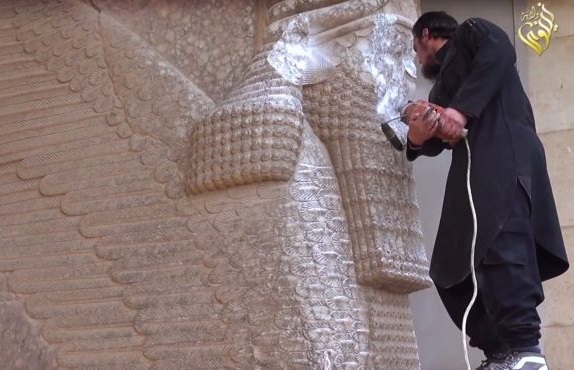An ISIS militant destroys a statue in Nimrud
Last month, the civilized world was horrified at the sack of yet another site of historical significance, as ISIS vandals bulldozed the city of Nimrud in Iraq, once a center of power in the Assyrian Empire. It was hardly the first time they had acted in their quest to destroy "idols," nor are they the only group to have taken similar measures. The Taliban in Afghanistan took dynamite to the great Buddhas of Bamiyan, reducing the 1,700-year old statues to rubble. These groups may cloak their destruction in the guise of following their religion, but this contempt for the past is a hallmark of many totalitarian ideologies. The Chinese government denies the massacre at Tienanmen Square, where an unknown number of Chinese citizens, possibly thousands, were killed, and actively blocks Internet content referencing the incident.
Even more shameful are the historical whitewashings of supposedly non-totalitarian governments and ideologies. As we mark the 100th Anniversary of the Armenian Genocide, in which over a million Armenians, Assyrians and members of other ethnic groups were executed by the Ottoman Turks, the Turkish government stubbornly refuses even to acknowledge that this genocide occurred. Instead, they assert that these groups massacred each other in the "fog of war," and they protest so vigorously at the use of the word "genocide" that some world leaders cowardly acquiesce in this demand for reasons of state.
Lest we Americans think ourselves above this type of behavior, we needn't look far to see it happening in the United States as well. Beyond its frequent battles over the teaching of evolution, the conservative Texas State Board of Education is notorious for tinkering with that state's history curriculum, attempting to paper over our history of slavery, water down the shame of the McCarthy era, and even sought to remove Thomas Jefferson from the curriculum (Jefferson, after all, spoke strongly of the need to separate church and state, something evangelical conservatives hate).
The difference in all of these attacks on our history is one of degree rather than one of intent. Texas conservatives, Chinese communists, and Islamic militants alike want to throw our shared heritage down the memory hole, so that the people under their governance can be more easily controlled. If there is nothing left of the past to look to, or the narrative of the past is tightly regulated to remove any basis for dissent, the citizens of the state will be far more amenable to the ruling ideology, whether religious or secular. The crime of trying to erase history not only deprives us of our past, it affects our present and future as well. Without understanding history, how can we make wise decisions going forward? How can the United States deal with the question of race in a sensible and intelligent way if we deny the central importance of the question of slavery in the development of our country? How can we summon the courage to stop current genocides in the world if we lack the courage to even use the word "genocide" to describe past events?
The answer is, of course, that we cannot. Without an honest accounting with our history, we remain adrift in the present, unable to put the events we witness into any sort of context that makes sense of them. Without facing our own history, as individual countries and as a species, we remain forever children in a society that desperately needs us to become adults. Those who would erase, or sanitize, this history work to infantilize the whole world.

Comments
Post a Comment